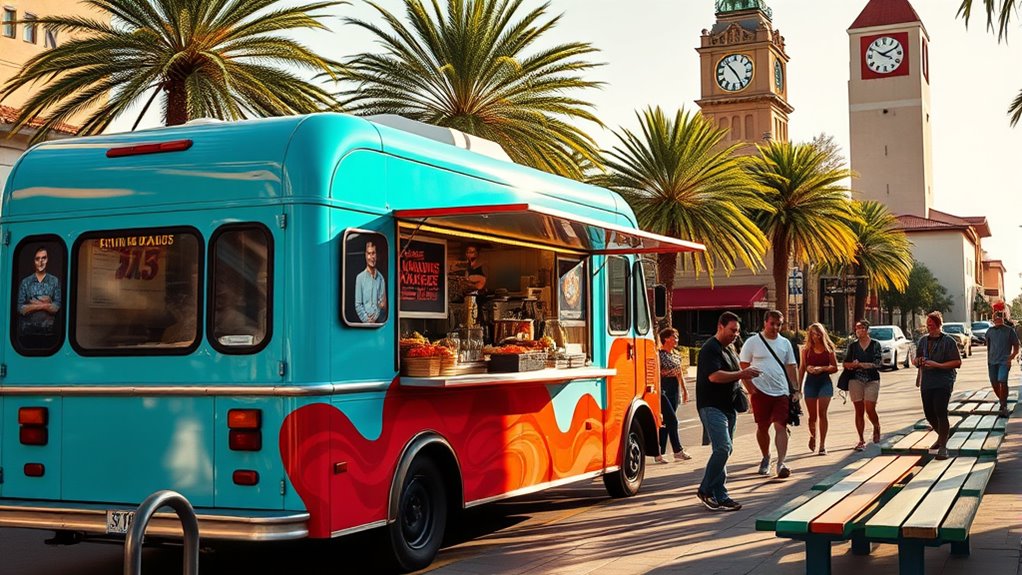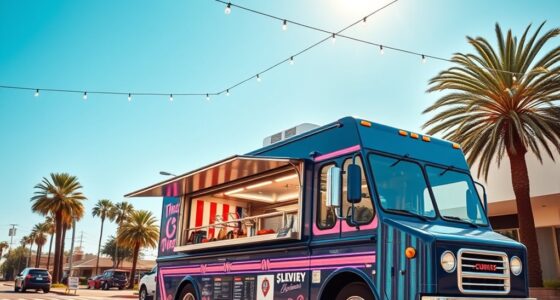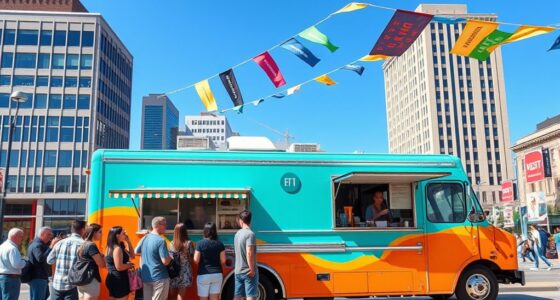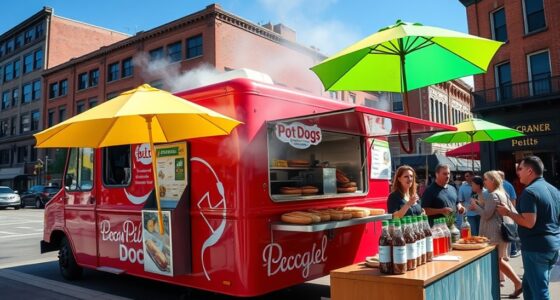To start a food truck in Riverside, CA, you’ll need to complete online permits through the city’s website and gather essential documents like proof of insurance and vehicle registration. Familiarize yourself with local regulations, parking zones, and health protocols. Budget for vehicle upgrades, equipment, and permits, and consider accessing local grants or community resources. Develop a menu that appeals to Riverside’s tastes, and use social media and community events to grow your presence. Keep exploring to learn more about making your food truck thrive.
Key Takeaways
- Complete Riverside’s online permit application and gather necessary health, insurance, and vehicle registration documents.
- Research local zoning, parking regulations, and health inspection requirements for food trucks.
- Develop a compliant menu tailored to Riverside’s local tastes, sourcing ingredients locally when possible.
- Utilize digital marketing and community engagement to build your local presence and attract customers.
- Explore funding options, grants, and insurance coverage to ensure a solid financial and operational foundation.
Vibrant Riverside Food Scene

Riverside boasts a lively and diverse food scene that attracts both locals and visitors alike. As a food truck owner, you can tap into this vibrant culinary environment by emphasizing local ingredient sourcing. Using fresh, regional ingredients not only supports nearby farms but also elevates your menu’s authenticity. Riverside’s culinary innovation encourages creativity, so don’t hesitate to experiment with fusion dishes or unique flavors inspired by local culture. The city’s appreciation for fresh, locally-sourced foods means your offerings will resonate with customers seeking quality and originality. Additionally, understanding dream symbolism can inspire creative marketing narratives that connect with customers on a deeper level. By embracing Riverside’s dynamic food scene, you can stand out, build a loyal following, and bring a fresh perspective to the city’s already thriving culinary landscape.
Understanding Local Requirements
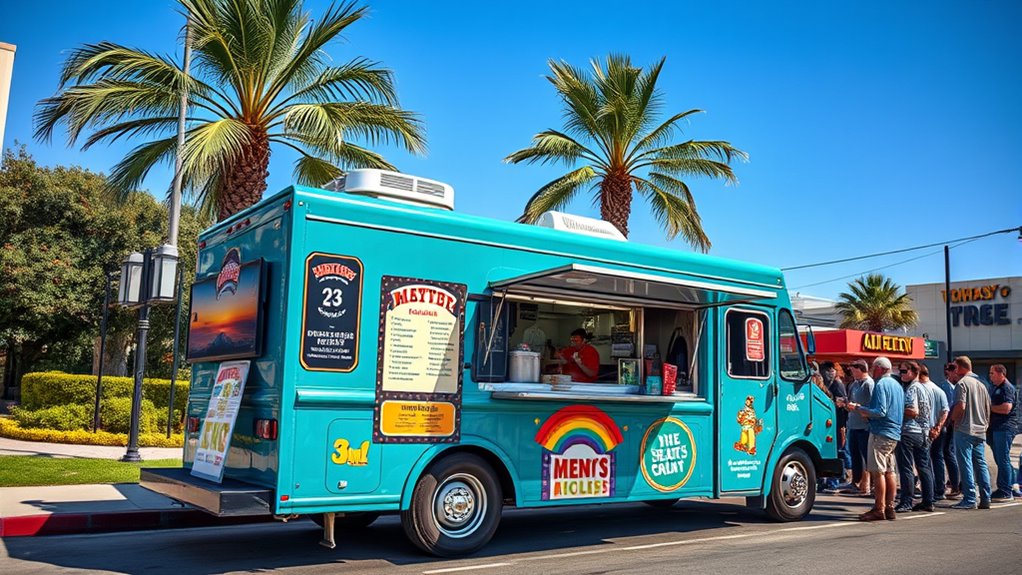
To operate a food truck in Riverside, you need to understand the local requirements, starting with the online permit application process. Make sure you’re familiar with sanitation protocols and record-keeping to stay compliant. Also, check out the designated food truck zones to find the best spots for your business. Additionally, understanding local regulations for food trucks can help you avoid common compliance issues and ensure smooth operation.
Online Permit Application Process
Managing the online permit application process can seem intimidating, but understanding the local requirements simplifies the steps. To start, visit Riverside’s official permitting website and create an account. Next, gather all necessary documents, like proof of insurance, vehicle registration, and health permits. Finally, follow these steps:
- Complete the online permit application form, ensuring all details are accurate.
- Upload required documents in the specified formats.
- Pay the application fee through the secure portal.
Sanitation Protocols and Record-Keeping
After completing your permit application, paying close attention to sanitation protocols guarantees your food truck meets local health standards. You must implement strict food safety practices, including proper cleaning procedures for all surfaces and equipment. Regularly sanitize utensils, prep areas, and storage containers to prevent contamination. Keep detailed records of cleaning schedules, inspections, and staff training to demonstrate compliance with Riverside’s health regulations. Consistent record-keeping helps identify areas for improvement and ensures accountability. Additionally, monitor food temperatures and storage conditions daily, documenting findings accurately. These efforts not only protect customers but also build your reputation for safety and reliability. Staying diligent with sanitation protocols and record-keeping is essential for operating legally and successfully in Riverside’s competitive food truck scene.
Designated Food Truck Zones
Understanding local requirements for designated food truck zones is essential for legal and smooth operation in Riverside. To ensure compliance, you need to familiarize yourself with parking regulations and health inspection rules. Here are three key points to consider:
- Check which areas are officially designated for food trucks, and ensure you park only in these zones.
- Confirm parking duration limits to avoid fines or towing.
- Maintain high standards during health inspections, especially when operating in designated zones, to meet local food safety requirements.
Setting Up Your Base of Operations
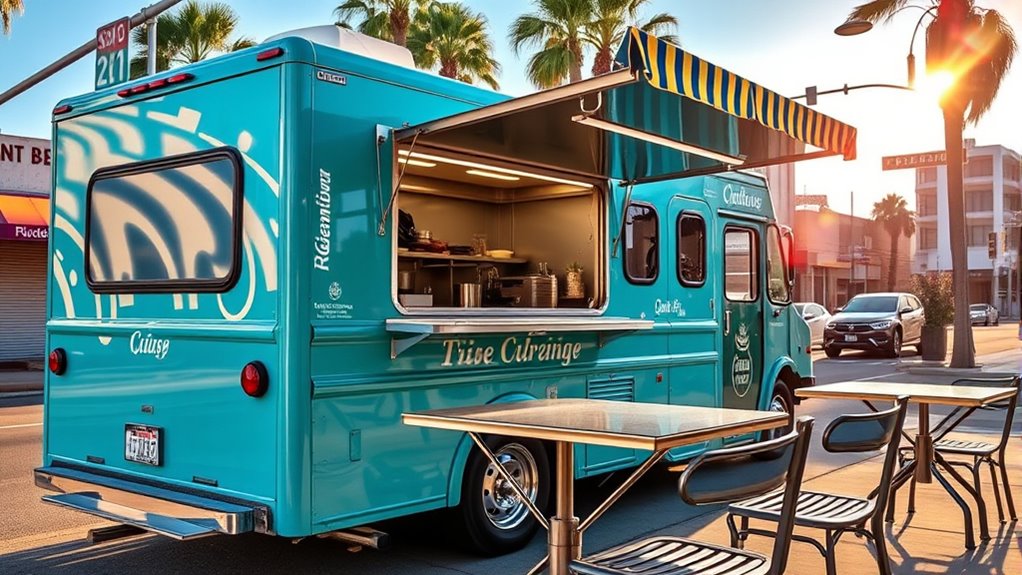
Choosing the right shared kitchen licensing options can save you time and money while ensuring compliance. You’ll also need to select custom kitchen equipment that fits your menu and operational needs. Making these decisions carefully sets a strong foundation for your food truck’s success. Additionally, considering portable kitchen equipment can enhance your mobility and efficiency during daily operations.
Shared Kitchen Licensing Options
Setting up your food truck’s base of operations often involves exploring shared kitchen licensing options, which can offer a cost-effective and flexible solution. These shared kitchens, also known as culinary incubators, provide licensed spaces where you can prepare your food legally and safely. Here are some benefits:
- Reduce startup costs by sharing equipment and facilities.
- Gain access to professional-grade kitchens without long-term leasing.
- Network with other food entrepreneurs and learn industry tips.
Shared kitchen licensing allows you to meet health and safety regulations without investing heavily in your own space. Culinary incubators are especially helpful in Riverside, giving you a reliable base to test recipes, prep ingredients, and build your brand confidently.
Custom Kitchen Equipment Selection
Selecting the right kitchen equipment is crucial for ensuring your food truck operates efficiently and meets all safety standards. Your custom kitchen must be tailored to your menu and workflow, so careful equipment selection is essential. Focus on durable, space-saving appliances designed for mobile use, including refrigeration, cooking, and prep stations. Prioritize quality to minimize maintenance and ensure reliability during busy hours. Consider your menu’s needs—whether you need fryers, grills, or ovens—and choose equipment that fits your space without sacrificing functionality. Properly selected equipment will streamline operations, improve safety, and boost productivity. Remember, your custom kitchen setup should facilitate smooth service and meet health regulations, so invest time in choosing equipment that aligns with your business goals and operational demands.
Budgeting and Financing Your Food Truck
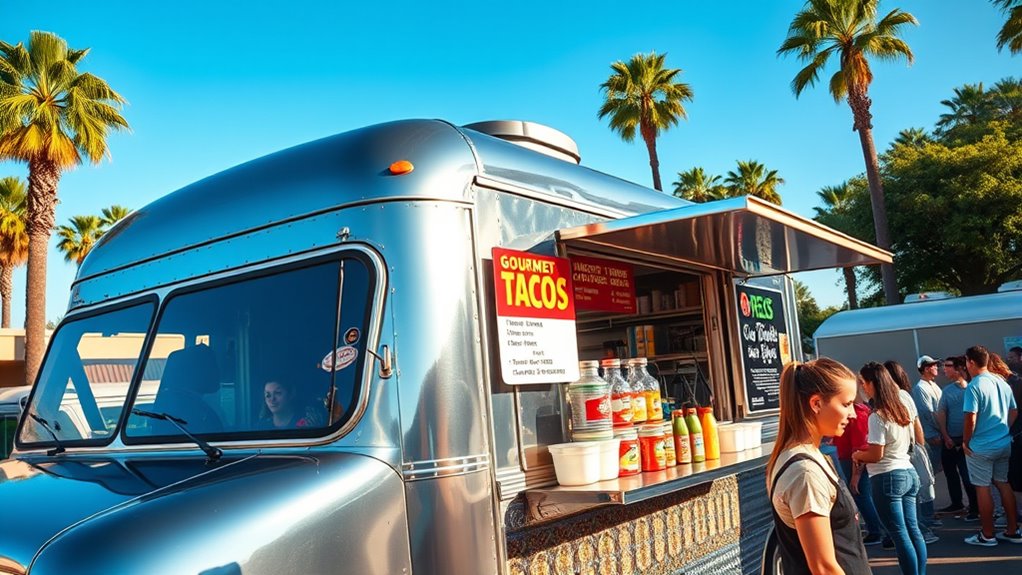
To get your food truck on the road, you need to plan for initial vehicle customization costs and explore local small business grants that can ease your expenses. It’s also essential to budget for liability coverage to protect your business from unforeseen risks. By understanding these financial aspects, you can set a strong foundation for your food truck venture in Riverside, and considering the importance of regular maintenance can help ensure your vehicle operates efficiently and lasts longer.
Initial Vehicle Customization Costs
Customizing your food truck can be a significant expense, but understanding the costs involved helps you plan your budget effectively. The initial vehicle customization costs typically include essential upgrades like a vehicle wrap, custom shelving, and equipment installation. Here’s what you might expect:
- Vehicle wrap: A vinyl wrap transforms your truck’s exterior, costing between $2,500 and $5,000, depending on design complexity.
- Custom shelving: Installing tailored shelves for efficient storage often ranges from $1,000 to $3,000.
- Additional upgrades: Upgrades like cooking equipment or signage can add another $5,000 or more, depending on your menu needs.
Knowing these costs helps you allocate funds wisely while creating a professional, eye-catching food truck.
Local Small Business Grants
Are you aware of how local small business grants can help fund your food truck venture? These grants can ease budgeting, allowing you to focus on building your food truck branding and forming vendor partnerships. Many grants target new entrepreneurs in Riverside, providing vital startup capital. To maximize your chances, research programs offering support for food trucks and small businesses. Here’s a quick overview:
| Grant Name | Focus Area | Eligibility |
|---|---|---|
| Riverside Small Biz Fund | Startup costs, food trucks | Local residents, new businesses |
| Riverside Foodie Grant | Food industry, branding | Food vendors, branding initiatives |
| Local Partnership Grants | Vendor collaborations | Small vendors, community projects |
| Small Business Innovation | Innovation, growth | Tech and branding-focused ventures |
Securing these grants can help you develop a strong foundation for your Riverside food truck.
Liability Coverage for Food Trucks
Securing the right liability coverage is a key step in budgeting and financing your food truck business. Without proper insurance policies, you risk significant financial setbacks. To keep your business protected, consider these points:
- Choose comprehensive liability coverage to protect against accidents or injuries on your food truck.
- Review policies that cover property damage and customer injuries, ensuring you’re fully covered.
- Shop around for insurance policies that fit your budget while providing essential liability coverage.
Having the right liability coverage helps you manage risks and keeps your finances stable. It’s an investment that safeguards your food truck, your reputation, and your future growth in Riverside. Don’t overlook this crucial step in your journey to success.
Designing Your Menu and Pricing Strategy
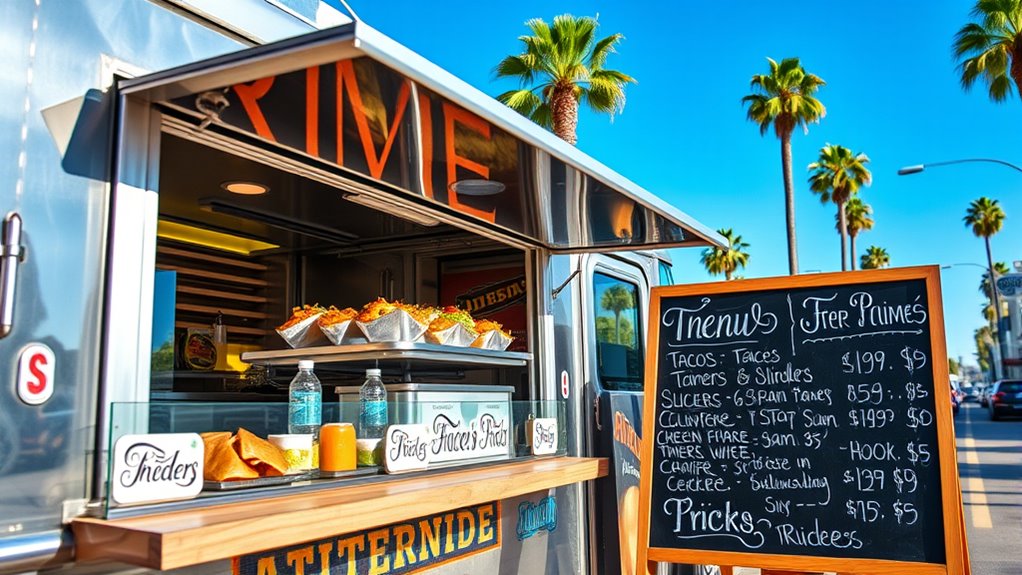
To attract Riverside customers, you need to tailor your menu offerings to local tastes and preferences. Keeping your dishes well-balanced in cost guarantees you stay profitable while providing quality options. By focusing on customization and managing your expenses, you can create a menu that appeals and sustains your food truck business. Incorporating popular local flavors and diverse beach experiences can also help attract a wider customer base.
Customizing Dishes for Riverside
How you design your menu and set your prices can make or break your food truck’s success in Riverside. To customize dishes effectively, consider local cultural influences that resonate with your audience. Focus on ingredient sourcing by using fresh, high-quality ingredients that reflect Riverside’s diversity. Here are three ways to tailor your offerings:
- Incorporate popular local flavors, like Mexican or Asian influences, to attract diverse customers.
- Source ingredients from nearby farmers or markets to ensure freshness and support the community.
- Adjust your menu items based on customer feedback, emphasizing dishes that highlight Riverside’s unique culinary heritage.
Cost Control and Menu Balance
Balancing your menu and controlling costs are essential steps to make sure your food truck remains profitable in Riverside. Focus on menu balance by offering a variety of dishes that appeal to different tastes without overextending your ingredients. This helps prevent waste and keeps inventory manageable. Implement effective cost control by pricing items strategically—cover your costs while staying competitive. Use portion control to reduce waste and maximize profit margins. Regularly review sales data to identify best-sellers and cut underperforming items. Simplify your menu when possible to streamline prep and inventory needs. Maintaining a tight menu with carefully priced options ensures you maximize profit while providing customers with quality, diverse choices. Proper cost control and menu balance are key to long-term success.
Technology and Operations
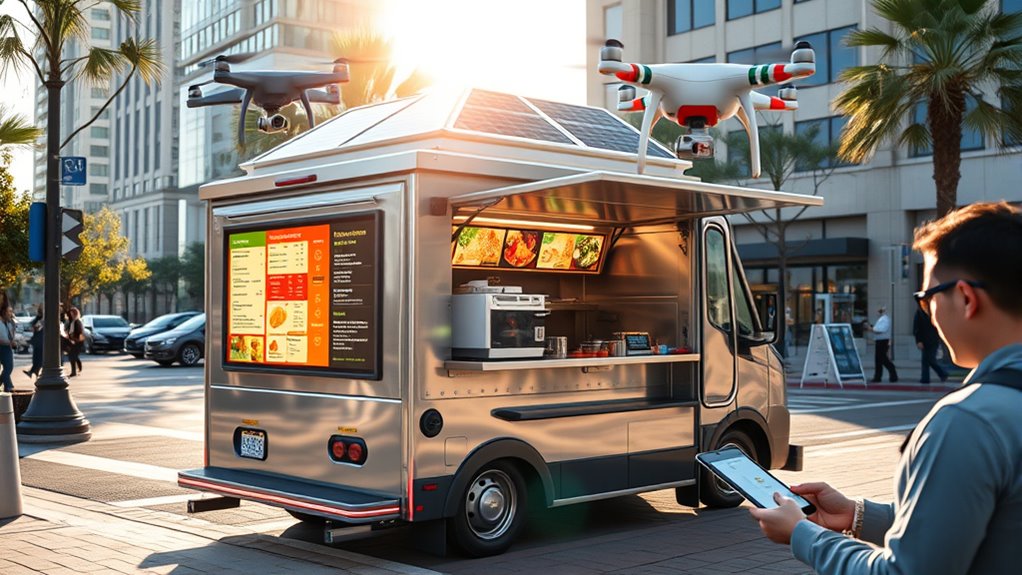
Using contactless payment options can speed up your sales and improve customer satisfaction. Real-time stock tracking software helps you manage supplies efficiently and avoid shortages. Incorporating these technologies streamlines your operations and keeps your food truck running smoothly.
Contactless Payment Options Available
To enhance convenience and safety, the food truck in Riverside offers contactless payment options, allowing you to pay quickly without handling cash or touching payment terminals. With contactless payments, you can complete a digital transaction in seconds, making your experience seamless. Here are some benefits:
- Use your smartphone or contactless card for quick, secure payments.
- Reduce the risk of germs by avoiding physical contact.
- Enjoy faster transactions during busy hours, saving you time.
These digital transactions ensure your payment process is smooth and safe. Whether you’re paying with Apple Pay, Google Pay, or a contactless credit card, you’ll appreciate the simplicity and security of contactless payments. It’s an efficient way to support local vendors while prioritizing health and safety.
Real-Time Stock Tracking Software
Implementing real-time stock tracking software has transformed how the Riverside food truck manages inventory and operations. With this technology, you can monitor inventory levels instantly, reducing waste and preventing shortages. It streamlines inventory management by automatically updating stock counts as you serve customers, ensuring accuracy. This software also enhances supply chain logistics, allowing you to track ingredient deliveries and coordinate restocking efficiently. By gaining real-time insights, you can make prompt decisions about purchasing and menu adjustments, optimizing profitability. Additionally, it helps identify slow-moving items and forecast demand more accurately. Overall, real-time stock tracking software simplifies complex inventory processes, improves operational efficiency, and keeps your food truck running smoothly in a competitive environment.
Marketing and Growing Your Presence
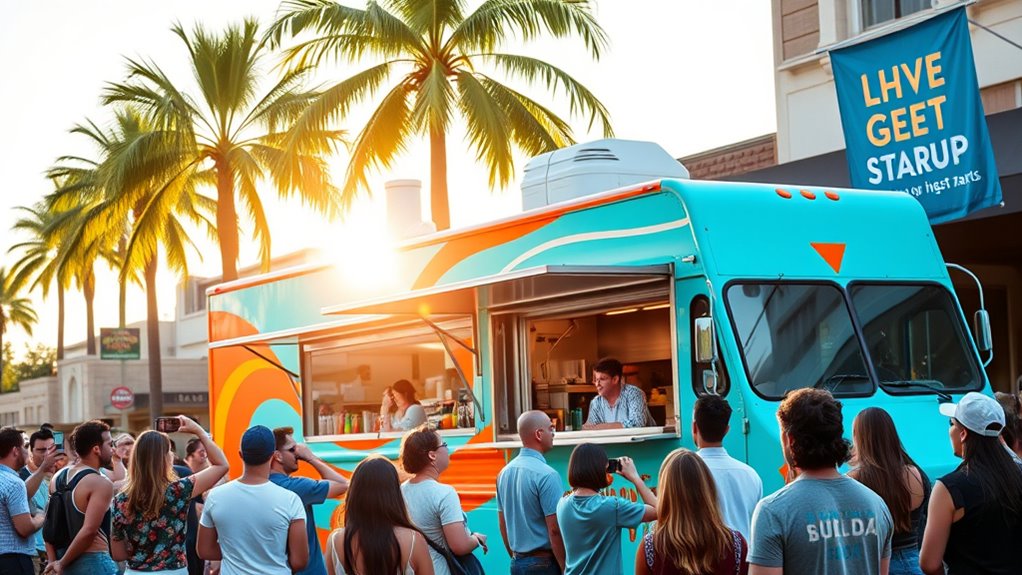
To grow your presence in Riverside, you should regularly schedule appearances at local events and weekly markets to build your customer base. Participating in local food festivals can also boost your visibility and attract new fans. Consistent effort in these areas helps establish your truck as a staple in the community.
Scheduling Weekly Event Appearances
Scheduling your weekly event appearances is essential for building a consistent presence and attracting repeat customers. Regular event scheduling helps reinforce your food truck branding and keeps you top of mind in Riverside. To maximize your efforts:
- Choose a few high-traffic locations and stick to a routine.
- Use social media and local event calendars to promote your schedule.
- Build relationships with event organizers for prime spots and better visibility.
Consistency creates familiarity, which encourages customers to visit regularly. When you establish a reliable schedule, your audience knows when to find you, increasing sales and brand loyalty. Keep track of your event calendar and adjust as needed to ensure your food truck remains a familiar, go-to option in the community. Great event scheduling is a key step in growing your presence.
Engaging Local Food Festivals
Have you considered how local food festivals can markedly boost your food truck’s visibility and customer base? Participating in these events allows you to showcase your unique offerings, especially when emphasizing local ingredient sourcing. Highlighting fresh, regionally sourced ingredients appeals to health-conscious customers and builds community trust. Plus, festivals are perfect for celebrating cultural food influences, giving you the chance to introduce authentic dishes that stand out. Engaging with festival organizers can also lead to repeat opportunities, expanding your presence in Riverside. Use these platforms to share your story, emphasizing your commitment to local sourcing and cultural authenticity. The more you participate, the more your food truck becomes a familiar favorite, encouraging loyal customers and word-of-mouth growth.
Local Networking Opportunities Boost Success

Local networking opportunities play a crucial role in helping food truck owners in Riverside succeed. Connecting with others can open doors to new customers and collaborations. To maximize these benefits, consider:
- Building your presence on social media to engage with the local community and promote your schedule.
- Partnering with nearby businesses and community events to increase visibility and foster trust.
- Attending local meetups or food truck alliances to share insights, resources, and support.
These efforts help you establish credibility and loyalty. Engaging regularly through social media keeps your fans informed, while community partnerships create a strong local network. Together, these strategies boost your chances of success and make your food truck an essential part of Riverside’s lively food scene.
Frequently Asked Questions
What Permits Are Required for Seasonal or Temporary Food Truck Events?
For seasonal or temporary food truck events, you’ll need event permits from Riverside’s city or county authorities. You may also require seasonal licensing specific to the event duration. Check with local health departments for temporary food service permits, and verify your truck complies with health and safety standards. Applying early helps, so contact the Riverside city permits office and health department to streamline your approvals and avoid delays.
How Can I Find Reliable Food Truck Suppliers in Riverside?
You might worry about finding reliable food truck suppliers in Riverside, but building strong vendor relationships makes it easier. Start by researching local suppliers with good reviews and proven supplier quality. Attend industry events or join local business groups to network and get recommendations. Reach out directly to potential vendors, ask about their experience, and request samples. This proactive approach helps you secure trusted suppliers who support your food truck’s success.
Are There Specific Health and Safety Standards Unique to Riverside?
Yes, Riverside has specific health and safety standards you need to follow. You must adhere to local food safety regulations and meet health inspection requirements set by Riverside County. These include proper food handling, sanitation, and equipment standards. You should regularly check with the Riverside County Department of Environmental Health to stay updated on any changes or additional regulations, ensuring your food truck remains compliant and operates smoothly.
What Insurance Coverage Is Recommended for Riverside Food Truck Owners?
Think of insurance policies as your safety net when the unexpected strikes. As a Riverside food truck owner, you should prioritize liability coverage to shield against accidents, damages, or injuries. Consider all-encompassing general liability insurance, vehicle coverage, and workers’ compensation if you hire staff. These policies act like a fortress, protecting your livelihood and giving you peace of mind to focus on serving up delicious food without worry.
How Do Local Riverside Events Impact Food Truck Operating Hours?
Local Riverside events markedly impact your food truck’s operating hours by requiring you to adjust your event scheduling to maximize community engagement. As you plan, consider the event times and popularity to make certain you’re open when potential customers are most likely to visit. Participating in these events not only boosts your visibility but also fosters community engagement, helping your food truck thrive in Riverside’s vibrant local scene.
Conclusion
Starting a food truck in Riverside, CA, puts you at the heart of a vibrant food scene with over 350 restaurants and a 7.2% growth in food service jobs last year. By understanding local rules, crafting a unique menu, and leveraging community events, you can stand out. With the right planning and connections, your food truck can become a favorite hotspot. Immerse yourself—Riverside’s bustling market is ready for your culinary adventure!
